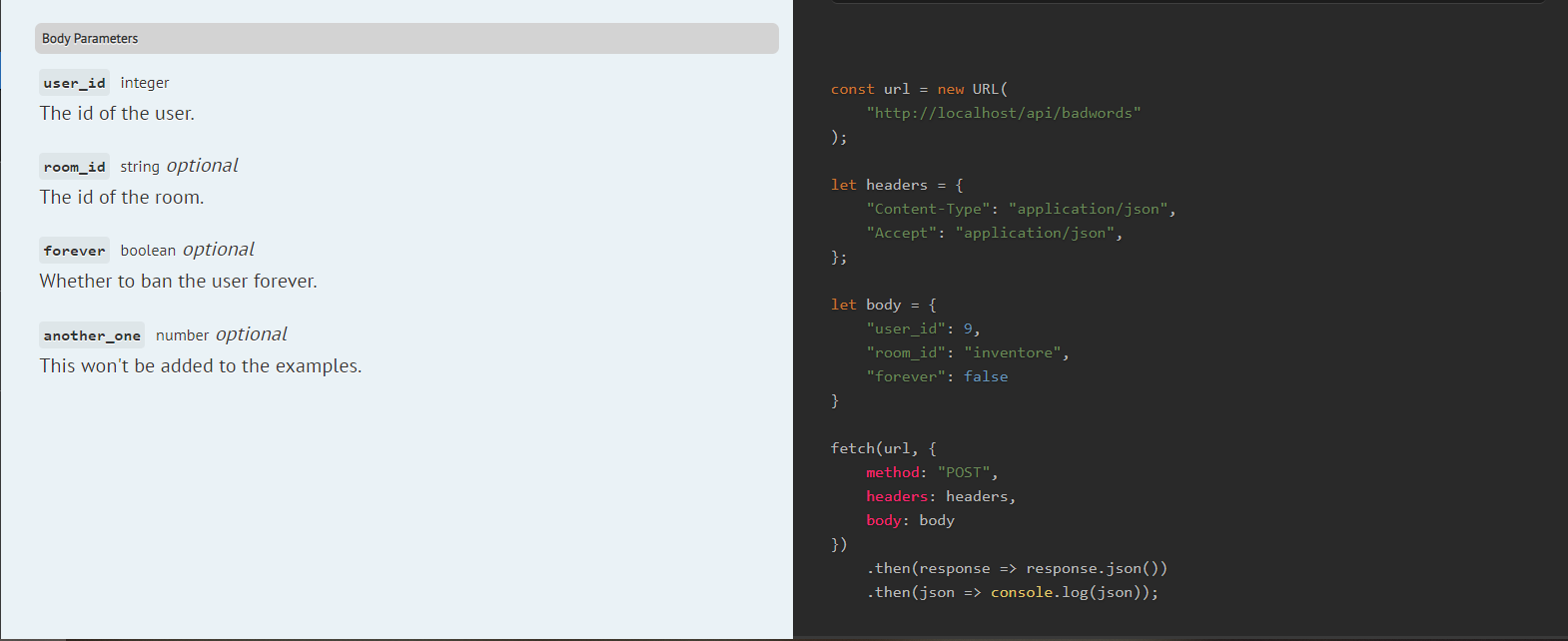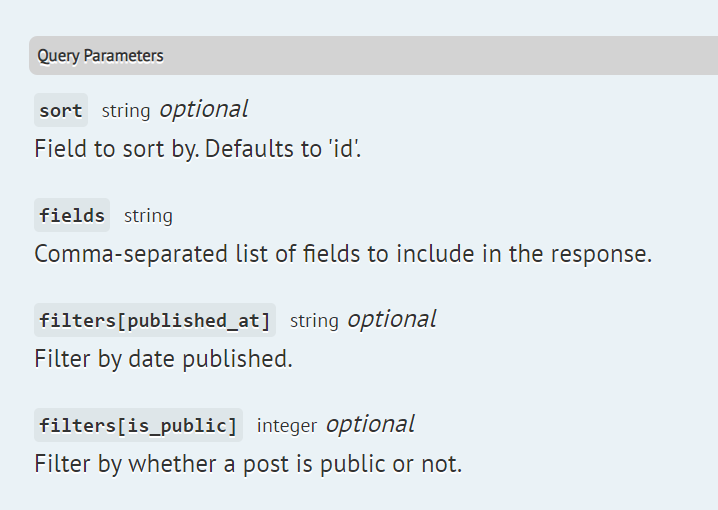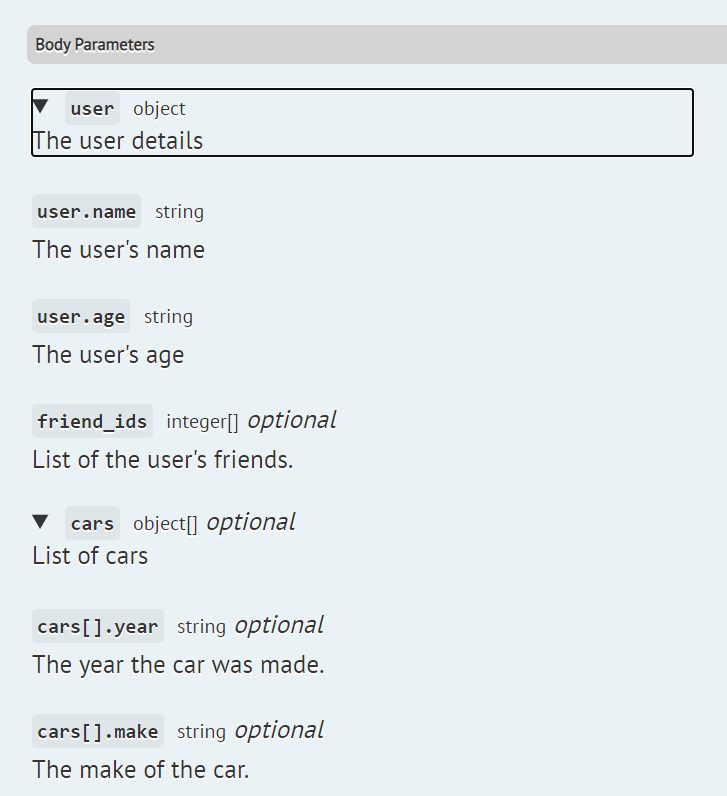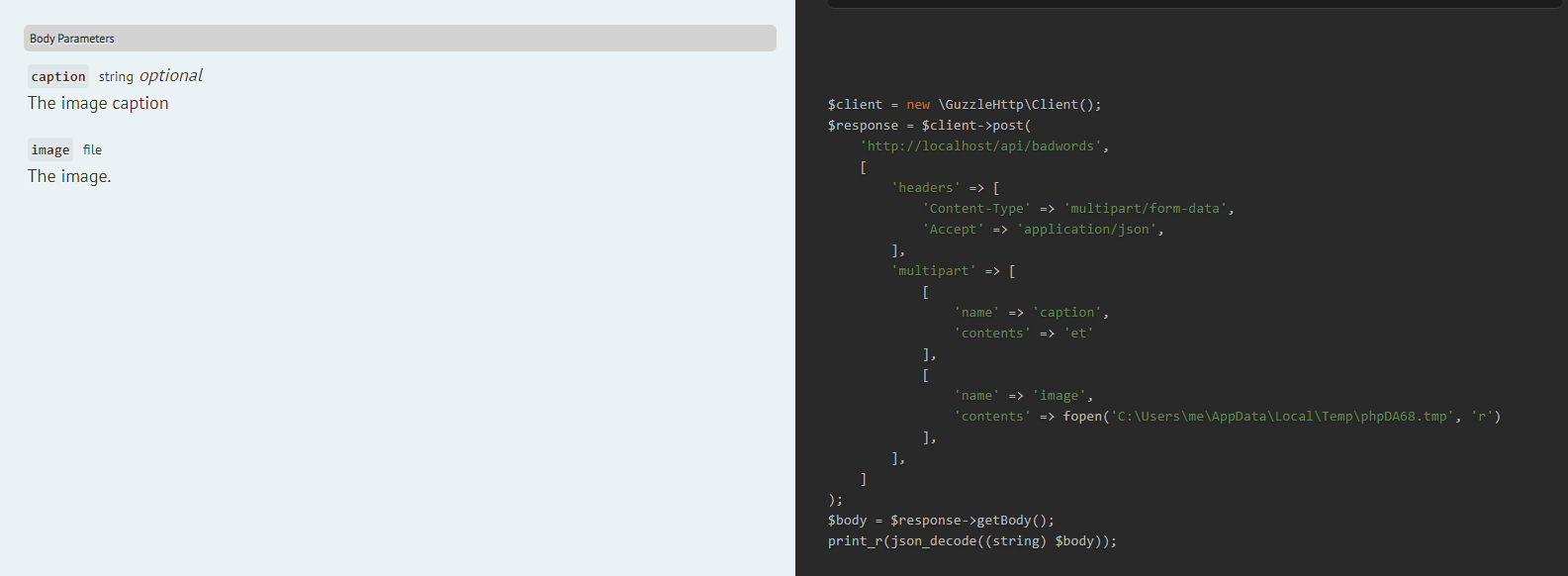Query and body parameters
Scribe automatically extracts details about your URL parameters from your routes. It can figure out the names, required/optional status and sometimes the types of your parameters. However, you can overwrite this information or add new details, such as a description, using the @queryParam/@bodyParam annotations
Remember, for Express and Restify, docblocks must go on the route definition.
@queryParam and @bodyParam
To describe query or body parameters for your endpoint, use the @queryParam and @bodyParam annotations on the method handling it.
The @bodyParam tag takes the type of the parameter (within braces {}), its type, an optional "required" label, and an optional description. The @queryParam tag follows the same format.
Valid types:
stringinteger/intnumberboolean/boolobject(see Array and object parameters below)file(see File uploads below)
Additionally, you can append [] to a type any number of times to indicate an array field (integer[] = array of integers).
array is not a supported type, and may lead to unexpected errors. You should rather define the type of the array (eg int[], string[]).
Examples:
- Body parameters
- Query parameters
/**
* @bodyParam {int} user_id required The id of the user. Example: 9
* @bodyParam {string} room_id The id of the room.
* @bodyParam {boolean} forever Whether to ban the user forever. Example: false
* @bodyParam {number} another_one This won't be added to the examples. No-example
*/

/**
* @queryParam {string} sort Field to sort by. Defaults to 'id'.
* @queryParam {string} fields required Comma-separated list of fields to include in the response. Example: title,published_at,is_public
* @queryParam {string} filters[published_at] Filter by date published.
* @queryParam {integer} filters[is_public] integer Filter by whether a post is public or not. Example: 1
*/


Specifying or omitting examples
By default, Scribe will generate a random value for each parameter, to be used in the example requests and response calls. If you'd like to use a specific example value, you can do so by adding Example: <your-example> to the end of the parameter description.
If you want Scribe to omit a certain optional parameter in examples and response calls, end the description with No-example. It will still be present in the docs.
For instance:
/**
* @queryParam {string} sort Field to sort by. Defaults to 'id'. Example: published_at
* @queryParam {string} fields required Comma-separated fields to include in the response. Example: title,published_at,id
* @queryParam {string} filters[published_at] Filter by date published. No-example
* @queryParam {string} filters[title] Filter by title. No-example
*/
gives:

Array and object parameters
Sometimes you have parameters that are arrays or objects. To handle them in @bodyParam and @queryParam, Scribe uses the following convention:
If you can, you should avoid using query parameters that are arrays or objects. There isn't a standardised format for handling them, so the way your API clients set them may be different from what your server expects (and what Scribe generates).
Arrays
For arrays, use a single field with type <type of items>[]. For instance, to denote an array cars of elements of type integer:
@bodyParam {integer[]} cars
@bodyParam {integer[]} cars This is a description. Example: [4, 6]
@bodyParam {string[]} colors Example: ["red", "blue"]
Objects
For objects, you need:
- a parent field with type
object - an entry for each field, named with the dot notation
<parent name>.<field>
For instance, to denote an object cars with a field name of type string and a field year of type number:
@bodyParam {object} cars
@bodyParam {string} cars.name
@bodyParam {number} cars.year
You can also add descriptions and examples to the parent or children fields if you wish:
@bodyParam {object} cars Car details. Example: {"name": "Carpenter", "year": 2019}
@bodyParam {string} cars.name Name of the car.
@bodyParam {int} cars.year Example: 1997
Arrays of objects
For an array of objects, you need:
- a parent field with type
object[] - an entry for each field, named with the dot notation
<parent name>[].<field>.
For instance, to denote an array of objects cars with each item having field name and year:
@bodyParam {object[]} cars List of car details. Example: [{"name": "Carpenter", "year": 2019}]
@bodyParam {string} cars.name Name of the car.
@bodyParam {int} cars.year Example: 1997
If your entire request body is an array, just omit the field name:
@bodyParam {object[]} []
@bodyParam {string} [].name
@bodyParam {int} [].year
Examples:
- Body parameters
- Query parameters
/**
* @bodyParam {object} user required The user details
* @bodyParam {string} user.name required The user's name
* @bodyParam {string} user.age required The user's age
* @bodyParam {int[]} friend_ids List of the user's friends.
* @bodyParam {object[]} cars List of cars
* @bodyParam {string} cars[].year The year the car was made. Example: 1997
* @bodyParam {string} cars[].make The make of the car. Example: Toyota
*/

/**
* @queryParam {string} sort Field to sort by. Defaults to 'id'.
* @queryParam {string[]} fields required Comma-separated list of fields to include in the response. Example:
title,published_at,is_public
* @queryParam {object} filters Fields to filter by
* @queryParam {string} filters.published_at Filter by date published.
* @queryParam {string} filters.is_public integer Filter by whether a post is public or not. Example: 1
*/

File uploads
To document file inputs with @bodyParam, use the type file. You can add a description and example as usual.
Adding a file parameter will automatically set the 'Content-Type' header in example requests and response calls to multipart/form-data.
For files, your example should be the path to a file that exists on your machine. This path should be either:
- absolute, or
- relative to your project directory.
If you don't specify an example, Scribe will generate a fake file for example requests and response calls.
/**
* @bodyParam {string} caption The image caption
* @bodyParam {file} image required The image.
*/
